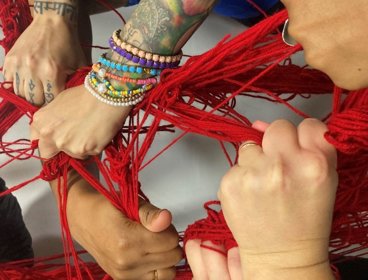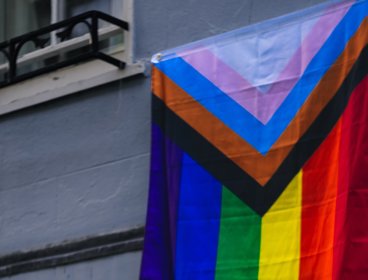By Rachel Pain, Newcastle University, and Jessica Wild, University of Westminster
Community and voluntary organisations work on the frontline of many topics of interest to geographers. Both of us have done much of our research on geographies of violence in collaboration with this sector. For Rachel, this includes Victim Support, Rape Crisis, domestic abuse services, youth charities, and refugee support organisations. For Jess, it has included homelessness, domestic abuse, substance use, and mental health services.
We use feminist approaches in our work. This means we are commited to practicing research in ways that are more ethical, caring, and participatory, and which has tangible benefits for organisations. Central to this is avoiding an ‘extractivist’ type of engagement in favour of one that is reciprocal and mutually beneficial. At a minimum, this means conducting research that is of interest and value to the lives and communities it features.
The advantages of working with community and voluntary organisations and the people they serve are wide-ranging. Most often, geographers seek help with recruiting research participants to hear directly from those experiencing the issues at stake, or they observe or participate to learn from people working on the ground. Given the ethical and risk management measures necessary for researching violence, services often play a crucial role in ensuring participants’ wellbeing during and after the research process.
In return, geographers are well placed to produce useful outputs for organisations, such as summary reports, web resources, exhibitions, videos and other materials for campaigning. Producing freely accessible resources for workers’ learning and development can also be beneficial - to this end, we’ve run workshops and training, and organised conferences. Ideally, our funding streams cover the costs of staff time, use of venues, refreshments and other resourcing, although we recognise this isn’t always possible.
Sometimes, the greatest benefits are less easy to enumerate. In co-produced research there’s often an exchange of ideas (theorising) in both directions. As activist scholars, we can align organising work with partner organisations. And we benefit hugely from the generosity, insight and creativity of their staff and service users in less discernible, but vitally important ways.
The challenges of this work are complex. Oftentimes they stem from the community or voluntary organisations’ limited material and time resources, to the extent that research seems like a luxury. Research fatigue arising from frequent approaches from researchers and students can be common, and well-justified wariness about time-sapping extractive research. Organisations may feel understandably reticent about providing researcher access to their workplaces or the people they support because of concerns about participants’ welfare, the impact of researchers’ presence, and how organisations will be represented given the hostile funding and political environment that many face.
This wider social and political landscape also poses challenges for research with VCSE organisations. The sector itself has been under sustained attack, shrunken after a decade of austerity and facing additional pressures from squeezed public services and rising poverty. Services for victims and survivors of violence have seen huge cuts, and at the time of writing further austerity is likely.
Many sexual and domestic abuse support services have also had to negotiate harassment from the so-called ‘culture wars’. One service for Black women had to close temporarily because of recent online abuse against its founder when she stood up against racism. And an unsubstantiated campaign that falsely positions trans survivors as a threat to other women survivors has targeted trans-inclusive services with threats of legal action and waves of hate on their helplines and social media. Consequently, valuable resources and time have been diverted to deal with these attacks; this deepens the emotional impact of this work, aggravates staff burnout, and obstructs the delivery of vital frontline service provision.
These contexts create a muddy field for geographers to enter, and underline the importance of asking not just ‘how can community and voluntary organisations support our research?’ but ‘how can we ally with community and voluntary organisations to do research that bolsters and supports their valuable work?’
From our experience, the following are useful guiding questions:
-
Discuss the research focus and possible questions early on and invite challenge and critique from VCSE partners. How might you create other opportunities for organisations to have meaningful input in shaping the study?
-
Consider what you can offer the organisation in return - skills, knowledge, time, financial or other resources (see examples above). Consider how you will build relationships and create a climate of trust, e.g. through volunteering or making frequent visits to a service before any research takes place. Might you be able to continue the relationship so it outlasts the research project?
-
If you are planning to recruit participants via ‘gatekeeper’ community and voluntary organisations, take time to map the measures you will put in place to ensure participants are supported and safe. Consider the impact recruitment will have upon organisations – does it create additional pressures?
-
Think about how you might give back to individual participants. If you’re involving them as ‘co-researchers’, can you create meaningful and accessible opportunities for learning or career development such as CV support, skills-building sessions, or providing employment references?
How to cite
Pain, R and Wild, J. (2023) Researching geographies of violence. Working with voluntary and community groups. Royal Geographical Society (with IBG) Guide. Available at: https://doi.org/10.55203/KYMG8431
About this guide
Working with voluntary and community organisations for some is a very important way to do geography. These organisation come in various shapes and sizes and may also often be referred to as the third sector, the voluntary sector, not-for-profit organisations, community groups or the civic sector. In this guide, we share the experiences of researchers doing geography in collaboration with community and voluntary organisations. A range of topics and issues are explored from health, disability and care, through to austerity, violence, and craft, amongst others. We learn about the approaches taken by geographers in their work with community and voluntary organisations, and some of the challenges they have negotiated in the process.




